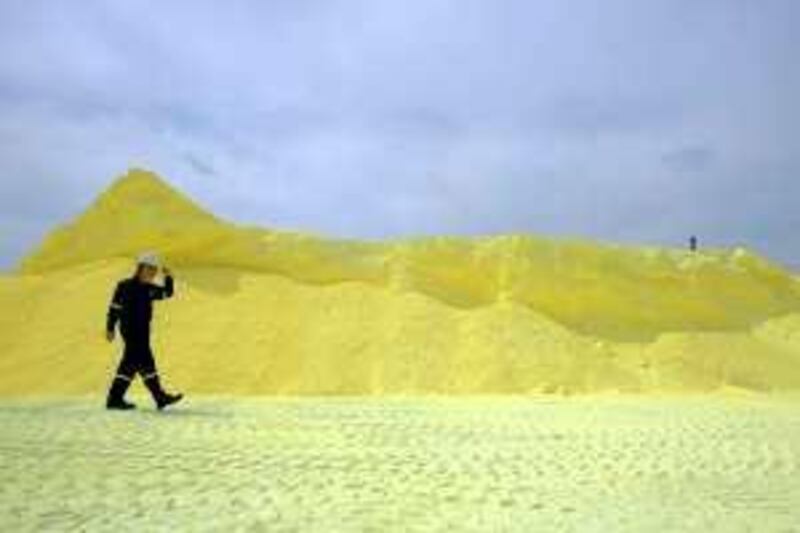DUBAI// Union Railway, which is planning a 1,500km rail network across the UAE, has set sulphur transport as its top priority, the strongest signal yet of Abu Dhabi's determination to proceed with the Shah sour gas project. Much of the sulphur would be a by-product of gas output from the US$10 billion (Dh36.73bn) Shah project south of Liwa, which appeared to hit a roadblock last month after the US energy company ConocoPhillips abruptly withdrew from its joint venture with Abu Dhabi National Oil Company (ADNOC) to develop the gasfield. The technically challenging and potentially dangerous project to pump "ultra-sour gas", containing about 23 per cent hydrogen sulphide, from deep underground had also been stalled over a controversial proposal to build the world's longest pipeline for liquid sulphur. The heated line would have run underground for 145km from Shah to Habshan, the site of Abu Dhabi's biggest onshore oilfield. Large quantities of sulphur are already produced at Habshan as a by-product of oil and gas processing and the Shah partners had proposed consolidating sulphur processing there. Building the sulphur pipeline, however, required complex engineering that most contractors were wary of undertaking. A rail line to connect Shah and Habshan to the Gulf port of Ruwais was proposed last year as an alternative for sulphur transport. Now, it seems the rail proposal has gained sufficient traction to prompt a government decision in its favour, which boosts prospects for Shah gas output to start on schedule in 2014. Richard Bowker, the chief executive of Union Railway, said yesterday: "Our focus at the moment, our real priority, is to make sure we meet the deadlines to deliver that sulphur. That is an absolute requirement." That was the first public acknowledgement that the branch line would be built. The initial section of the UAE rail network would be a line from Ruwais to Habshan, which would be operational by mid-2013, Mr Bowker said. That would be followed "very shortly thereafter" by the construction of an extension from Habshan to Shah, including a 65km section through sand dunes. The two sectors of the branch line would cover a combined distance of 266km. Union Railway was working closely with ADNOC on the project, Mr Bowker said. The entire UAE rail network would cost $11bn and be built over seven or eight years in a "phased rollout". Union Railway will seek expressions of interest from contractors in the first phase of the project within two months. "We are still finalising the contract package but it will be mostly design and build for this particular section," Mr Bowker said. "That leaves our options open for the rest of the network. Our aim is to award the first main contract by the end of this year because we do have a hard deadline." The Shah project's gas is considered an essential component of the UAE's master plan for keeping pace with the country's growing domestic power needs as it pursues industrial expansion amid a population boom. Other components include the first nuclear programme launched by a GCC nation and a proposal to generate 7 per cent of the UAE's electricity from renewable energy. ADNOC is seeking a new international partner for Shah but has also vowed to pursue the project alone if necessary. Industry sources have indicated ADNOC's gas subsidiary was seeking bids for a $2bn construction project to cover facilities for processing 7 million tonnes a year of projected Shah sulphur output. The railway project would encompass a network for freight and passengers extending from the Western Region of Abu Dhabi through Dubai, Sharjah and Ajman to the three Northern Emirates. Eventually it may include a high-speed link between Abu Dhabi and Dubai. Mr Bowker said the Government-owned rail company was holding "exploratory discussions" over financing and was in talks with local industrial companies to raise awareness of freight options.
Shah gas project spurs railway
Union Railway, which is planning a 1,500km UAE network, has set sulphur transport as its top priority, a signal of determination to proceed with the Shah sour gas project.

Editor's picks
More from the national




